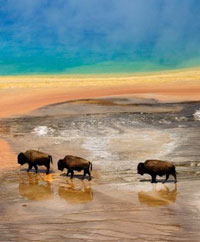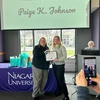|
Yellowstone Natonal Park is situated on one of the world's six known supervolcanoes. |
Yellowstone, part of a national park system that filmmaker Ken Burns hailed as “America’s best idea” in his 2009 documentary, will be the setting for “Stewardship of Public Lands: Politics and the Yellowstone Ecosystem,” a course to be offered during SUNY Fredonia’s Summer Session II.
The course will be held July 17-27 and has a fee of $2,400 plus six credits of tuition.
To learn more, contact William.Brown@fredonia.edu or Christina.Jarvis@fredonia.edu. The application deadline is March 1.
The iconic park is an ideal location for the course, given its dual mission to preserve natural wonders and rich biological diversity and provide some 2.2 million acres of wilderness that span parts of Wyoming, Montana and Idaho for the benefit and enjoyment of visitors – and the tension and debate that have risen.
The six-credit course combines AMST/ENGL296 American Identities and BIOL250 Ecology of National Park and can be applied to General Education credits for Natural Science, American History or Oral Communication. Its focus will be political disputes about public lands and environmental issues as they relate to Yellowstone — the first national park in America and the world — and, by extension, all public resources.
AMST/ENGL296 will utilize Yellowstone and its ecosystem as a case study to explore American identity, citizenship and democracy. It will weigh the balance between preservation and human access, investigate how competing views of nature — as a playground, research laboratory, cathedral and economic resource — influence management of the park, and study what happens when wolves, bison and other species roam outside park borders and impact ranching, mining and development. The role that average citizens can have on the future and sustainability of Yellowstone will also be addressed.
In BIOL250, students will utilize the park and surrounding ecosystems as a case study to explore the science of ecology and ecosystem biology. They will engage in methods used by scientists to explore natural resources as well as basic research techniques and data analysis. An emphasis will be given to ecological issues that relate to the management of public lands and the application of scientific models outside of biology.
The two courses will be linked through shared assignments, readings and field experiences and utilize an interdisciplinary approach, integrated readings and materials from history, art, literature, gender studies, ecology, sustainability, education and other disciplines.




